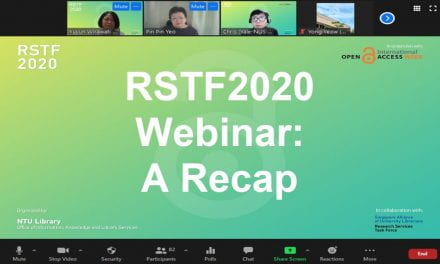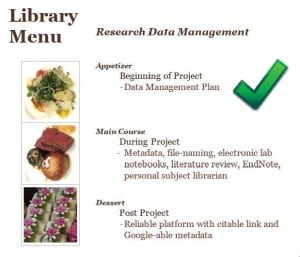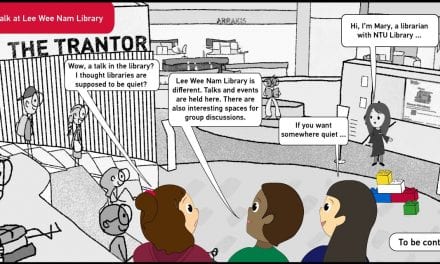Following the Open Science Talk on 15 August 2019, there has been much excitement going on about open science in NTU. One of the talk attendees, Dr. Alexa von Hagen*, decided that one of the ways she could play a role in open science is to organise a NTU ReproducibiliTea Journal Club. NTU Library is proud to have a chance to support Alexa by hosting the Club meetings.
There will be a formal introduction and invitation by Alexa during the 24 October 2019 Open Access Week event.
The following is an introduction by Alexa, the organiser of the NTU ReproducibiliTea Journal Club:
“ReproducibiliTea is a journal club focusing on promoting Open Science practices created by three early career researchers at Oxford University. The aim of this initiative is to offer weekly encounters for researchers of all career stages to get familiar with and critically discuss seminal publications of the Open Science movement. To date, there are 22 ReproducibiliTea journal clubs functioning across universities in Austria, Germany, The Netherlands, Sweden, the United Kingdom and the United States.
Following this initiative, we now aim to create a ReproducibiliTea journal club at NTU and create a platform to support researchers in adopting Open Science practices. We would like to kindly invite researchers at any career stage that are interested in the Open science movement to join us for a series of eight weekly journal club meetings. Although the selection of publications to be discussed in the ReproducibiliTea journal club are mainly directed at researchers in the fields of humanities and social sciences, we welcome researchers from other fields aiming for an interdisciplinary perspective on Open Science practices. On the 24th of October, we will briefly introduce the aims of the NTU ReproducibiliTea journal club, share a proposed schedule and reading list and invite you to sign up for the first ReproducibiliTea journal club meeting.”
The eight meetings will be held from 31 October 2019 to 23 Jan 2020, every Thursday (except second half of Dec 2019).
You can also join us virtually at this Microsoft Teams link.
Thursdays from 1-2pm
The Arc – Learning Hub North, TR+18 (LHN-01-06) for Weeks 1-6, TR+20 (LHN-01-08) for Week 7 and (NIE Library) for Week 8
Organized by Alexa von Hagen, Pierina Cheung, Suzy Styles and Gianluca Esposito
Supported by: NTU Library & NIE Library. Twitter: @SingReproTea
| Article | Theme | Link to Article | |
|
Week 1 31/10/19 |
A Manifesto for Reproducible Science |
The Problem Defined The general overview |
https://www.nature.com/articles/s41562-016-0021 |
|
Week 2 07/11/19 |
False Positive Psychology |
Examining Analytic Flexibility And why it is a problem |
http://journals.sagepub.com/doi/abs/10.1177/0956797611417632 |
|
Week 3 14/11/19
|
Measuring the Prevalence of Questionable Research Practices with Incentives for Truth Telling | Questionable Research Practices: are they really that common? And why are they problematic? |
http://journals.sagepub.com/doi/abs/10.1177/0956797611430953
http://journals.sagepub.com/doi/pdf/10.1177/1745691612459519 |
|
Week 4 21/11/19 |
Estimating the Reproducibility of Psychological Science | Reproducibility Now: Why many studies are not reproducible. | http://science.sciencemag.org/content/349/6251/aac4716 |
|
Week 5 28/11/19 |
Is the Replicability Crisis Overblown? Three Arguments Examined | Has the debate gone too far? Things will just turn out fine. | http://journals.sagepub.com/doi/pdf/10.1177/1745691612463401 |
|
Week 6 05/12/19 |
Open Science: What, Why and How | Open Data and Materials | https://psyarxiv.com/ak6jr |
|
Week 7 16/01/20 (TR+20, LHN-01-08) |
The Natural Selection of Bad Science | And what about the future? | http://rsos.royalsocietypublishing.org/content/3/9/160384 |
|
Week 8 23/01/20 (NIE Library, Blk 4, Level 2 – 4, 1 Nanyang Walk, Singapore 637616) |
changed to: Replicability Crisis |
changed to: Is the Replicability Crisis Overblown? Three Arguments Examined |
changed to: https://journals.sagepub.com/doi/full/10.1177/1745691612463401 |
Read the paper and come along for discussion, tea, snacks & open science!
Please note that photographs of you may be taken during the sessions for publicity purposes.
*Dr. Alexa von Hagen is a Research Associate from the Centre for Research in Child Development, National Institute of Education. She can be contacted at alexa.vonhagen@nie.edu.sg.







